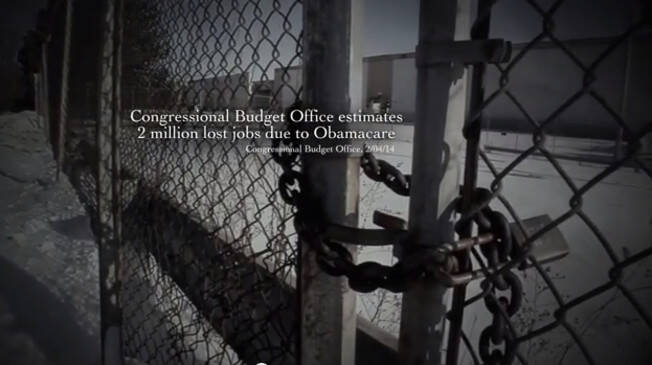That was quicker than I expected. TPM’s Dylan Scott has posted what may be the first 2014 congressional campaign ad with the bogus claim “2 million lost jobs due to Obamacare” superimposed over a black-and-white photo of padlocked factory gates. Yesterday I wondered about this possibility (see “Washington Post’s Scorekeepers Deliver a Game-Changer on Obamacare”), and North Carolina Senate candidate Thom Tillis has made it happen. “How many workers will have to lose their jobs?”, the commercials asks, though the 2 million figure comes from a Congressional Budget Office estimate that includes people who choose to work less because their health insurance costs are going down.
David Weigel reports that David Koch’s Americans for Prosperity lobbying group is also running ads on the Affordable Care Act as a generator of pink slips: “AFP’s free to run with the kulturkampf message that Obamacare will both kill jobs and turn people into loafers. Neither true nor intended.”
So we’ve got nine months ahead of demagoguery based on a misreading of a very wonky CBO report. But there’s also some more sincere concern about the ACA’s effect on labor force participation, something that’s a factor in any kind of public assistance (and, for that matter, private charity). The New York Times’Ross Douthat concedes that some people will be better off freed from the “job lock” that keeps them working long hours in dead-end jobs only to afford health insurance. The size of the CBO’s projected decrease in working hours still worries him:
But there also lots of people who emphatically do not benefit from being given an incentive to either detach from the workforce or (if they’re already unemployed or underemployed) remain detached rather than taking a lower-paying job. And given the current economic landscape, especially — in which persistently high unemployment coexists with a growing population of workers too discouraged to even look for work — the size and scope of a work-discouraging effect matters a great deal: The bigger the effect, the more likely that the people dropping out aren’t just, say, parents cutting hours to spend more time at home while the other spouse works full time, but people we should want to be attached to the workforce, for their own long-term good and the good of the economy as well.
As Slate’s Matthew Yglesias notes, “Almost any kind of social welfare program you can dream up is going to have some kind of tendency to reduce people's eagerness to work long hours. […] Nonetheless, a sustainable welfare state does need working people and a growing economy to sustain it.”
The “job killer” charge is going to be difficult for Republican candidates to resist, but Rep. Paul Ryan is going for a more subtle critique. At a Wednesday congressional hearing with CBO director Doug Elmendorf, he signaled that he was not clinging to the early, misleading headlines on the 2 million figure. (“Just to understand, it is not that employers are laying people off,” Ryan said into a microphone.)
Having distanced himself from the screamers in his party, the possible presidential candidate made his own attack, as reported by TPM’s Dylan Scott:
Ryan wasn’t thrilled with the CBO's finding. He said he was “troubled” by the report because it suggested that Obamacare was encouraging Americans “not to get on the ladder of life, to begin working, getting the dignity of work, getting more opportunities, rising the income, joining the middle class.”“This means fewer people will do that,” he said.
This is consistent with Ryan’s careful marrying of austere budget policies with a respect for the dignity of the poor. (See his declaration, “You cure poverty eye to eye, soul to soul,” rather than through government programs.) It’s an approach that may reassure middle-income suburban voters with reservations about the “mean” Republican Party, even if the actual poor are more skeptical.
Mother Jones’ Kevin Drum calls Ryan the GOP front-runner for 2016, partly because of weak competition but also because “This is all stuff that seems very delicately calculated to stay in the good graces of the tea party base while building up plenty of policy substance cred that will keep him attractive to moderate voters.” I agree that his “dignity of work” pitch could play very well among Republican primary voters in New Hampshire (a relatively low-poverty, high-wage state), especially if Iowa gives a win to someone patently unelectable such as Ted Cruz or Rand Paul.
But Ryan will be pressed on how far he’s willing to take the idea that health care should be reachable only from one of the upper rungs on the “ladder of life.” He needs a good answer to Jennifer Victor, at the Mischiefs of Faction blog, who argues that the CBO report has turned almost everyone into bean counters this week:
In the end, the ACA is a social safety net. All social safety net programs are costly, and none are designed to “improve the economy.” For the Democrats, it was convenient and serendipitous that the initial CBO evaluations of ACA indicated some economic benefits to the economy (such as deficit reduction and lower unemployment), but these consequences were — of course — never the goal of the ACA. The primary goal of the ACA was to get people affordable health insurance. The ACA is the government’s response to the terrible problem of 40 million Americans who had no health coverage and are essentially denied access to basic health care, which to many seems inhumane, especially in a rich country like ours.
Image from Talking Points Memo.








